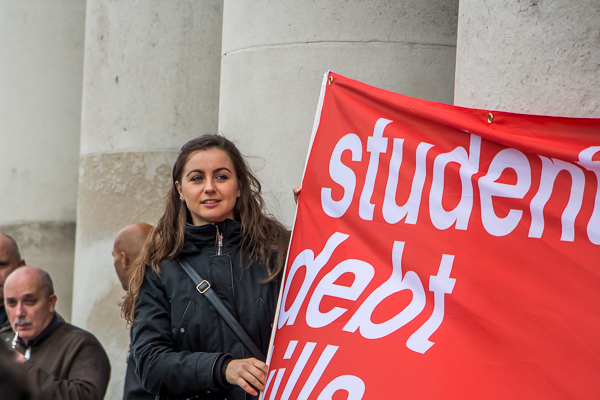The actions of University College Dublin Students’ Union (UCDSU) President Katie Ascough and the possibility of her impeachment have catapulted student politics into the national headlines. By taking the executive decision to remove information regarding accessing abortion from the UCDSU’s freshers’ guide Winging It, amidst a national debate on whether access to abortion should be allowed and despite a mandate to support the pro-choice side, Ascough has seen her presidency descend into jeopardy.
Ascough is neither the first, nor the last, to face such a challenge. The relationship students’ unions have with impeachment is complicated. From not following mandates to breaking university rules, the reasons why a president might be impeached vary between universities and their constitutions. While Ascough and her fellow officers in UCDSU are currently in the spotlight, the last 30 years have seen Trinity face two possible impeachments.
In 1990, then-Trinity College Dublin Students’ Union (TCDSU) President Ivana Bacik resigned from her position after breaking with a mandate that was voted on by the student population. Bacik, along with 12 other Trinity candidates, had been mandated to vote for a former TCDSU president in a Union of Students in Ireland (USI) election.
When the votes were counted, however, only 12 went to the Trinity candidate, with Bacik giving her vote to a former UCDSU officer. This act led to an internal investigation, which eventually resulted in Bacik’s resignation. Speaking to The University Times, Jack Leahy, a former TCDSU Education Officer, said that “she was going to go before she was pushed”. This resignation, however, seems to have had no effect on Bacik’s future aspirations. She has since enjoyed a successful political and academic career.
Twenty-three years later, another impeachment referendum was landed on the steps of House Six. Before his term was even properly underway, then-TCDSU President Tom Lenihan faced doubts regarding his ability to lead the union. Son of the late Brian Lenihan, the campaign for his impeachment attracted national attention. Leahy, who was Education Officer the year that Lenihan was President, said that Lenihan’s familial ties and the resulting national attention “blew the issue somewhat out of proportion”.
In May, several months before Lenihan took up his role as President, he was caught cheating in a third-year law exam. A subsequent disciplinary process led by the Junior Dean resulted in him having to repeat the exam. The campus community, however, wasn’t ready to let it go. Leahy said that when students returned in September, there was “a lot of people still gossiping and interested in seeing it further”. Eventually, the issue made it to the union’s council and a motion was passed to hold an impeachment referendum. Leahy claimed that the student who brought the motion did so with no ulterior motive. He wanted the issue put to students as “he felt that the students wanted a say in it”.
However, there was another facet to Lenihan’s actions. In a statement released at the time, Lenihan admitted that, since his election to TCDSU, he had been diagnosed with depression but had “neglected” medical treatment, which had “exacerbated” his condition. Admitting that while none of this excused his behaviour, Lenihan said it did “provide context” for his mental state going into the exam.
Leahy said that the sabbatical officers at the time were “quite united” on Lenihan remaining in his position. “That was an entirely personal matter and no one felt… I think no one who was that involved in the students’ union ever felt that strongly about that particular issue and sort of the personal aspect of it”, he said.
This unqualified support shown by TCDSU differs greatly to the situation that Ascough currently faces. Her fellow sabbatical officers have distanced themselves from her actions with one officer telling The University Times that her actions were “bullshit”. Leahy said that he doesn’t “see a lot of mirrors” between their situation and the one that Ascough and her team currently faces. “For all intents and purposes, they’ve put their president in a very difficult situation. Rightly or wrongly but they have”, he said.
An impeachment referendum, even if it is demanded by students, creates a “weird campus environment”, according to Leahy. The College Historical Society (the Hist) hosted a debate in the run-up to the referendum on whether Lenihan should remain in place or not. Despite the fact that there was support for a referendum on whether Lenihan should remain in his position or not, no-one came forward to run the campaign to see him impeached. This differs greatly to the situation that Ascough currently faces. A Facebook page entitled “Impeach UCDSU President” has over 1,000 likes and has been a prominent feature of the campaign so far. The group collecting signatures for the petition, which had to be done twice due to a constitutional issue with the first petition, managed to secure over 1,000 signatures both times.
Leahy explained that, once it was clear that a referendum was going to happen, “people didn’t feel comfortable actually making this a major issue”. Students were happy to have their say on the issue and when the vote came back in Lenihan’s favour, “people respected that” and the union “got on with it”.
Despite the discomfort it caused the union at the time, Leahy believes that a referendum on the issue wasn’t the worse thing that could have happened. Explaining the union’s thought process, Leahy said that the union was aware that people wanted to have a vote, and that students were “entitled” to have it. The union decided that “if it [the referendum] happens, it will be a decisively positive vote for the SU President so we may as well put it to bed”.







